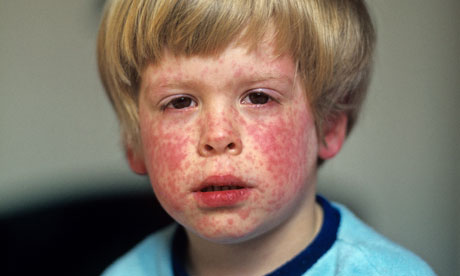
If you're off to France this summer you may not think of vaccinations. But France is in the grip of a measles epidemic, with more than 5,000 cases this year. There are also outbreaks in Denmark, Germany, Norway and Serbia. The US, which eliminated measles in 2002, is getting outbreaks caused by people returning from Europe. The National Travel Health Network and Centre advises un-vaccinated, non-immune people who are travelling to have two doses of MMR vaccine at least a month apart.
Why are there outbreaks?
Measles is very contagious. We need to have over 95% of the population vaccinated or immune to prevent outbreaks. In the UK, vaccination rates dropped after a paper by Andrew Wakefield (he was later struck off the medical register) fraudulently linked autism to the MMR vaccine. Other countries were influenced by his paper, which, combined with some complacency, led to vaccination rates dropping and cases of measles rising. The 2000 Irish outbreak saw 1,500 cases of measles and three deaths.
Isn't measles fine as long as your child is otherwise well?
Measles is nasty – a dry cough, runny nose, red eyes that are made sore by light and a reddish brown rash. The typical sign is grey white spots in the mouth and throat. It's caused by a virus, gives you a fever, and you feel ill for up to two weeks. There is no treatment.
It can cause complications such as earache and eye infections in 20% of people. Less commonly it can cause pneumonia, meningitis, encephalitis and worst of all subacute sclerosing panencephalitis, which is an inflammation of the brain that emerges some years after the measles infection (one in 100, 000 people).
Are side effects from the vaccine very common?
The immunisation advisory centre in New Zealand says the risk of encephalitis after a vaccine is one in a million compared to one in 1,000 with measles. Less than one in a million will get an allergic reaction with the vaccine, and 14% will get mild irritation on the site of the jab, or feel a bit feverish and rough.
What causes measles?
It is caused by a paramyxovirus that can live for up to two hours in air and is spread by people coughing and breathing out infectious droplets. It takes about 10 days to two weeks before you start to get a fever. The rash appears a few days after the fever starts. Babies under a year and adults over 32, who have not been immunised and may not have had the disease, are most at risk.
What if I'm pregnant and not immune?
See your doctor. Measles in pregnancy can cause premature labour and other problems. If you think you've been exposed see a doctor as soon as possible.
And if I do get measles?
Do not have a party. Keep it to yourself; people with weak immune systems can be killed by measles. You are infectious for four or five days after the rash comes out. Make sure you drink enough and take paracetamol. If you develop complications such as a cough, difficulty breathing or feel confused, call your doctor.
• This article was amended on 19 May 2011. The original said that measles is a paramoxyvirus. This misspelling has been corrected.

